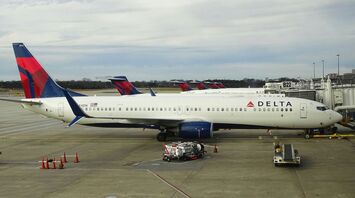Delta Air Lines Flight Diverts to London Heathrow Due to Ill Crew

On June 28th, Delta Air Lines flight 23 from Munich International Airport (MUC) to Detroit Metropolitan Wayne County Airport (DTW) made an unscheduled stop at London Heathrow International Airport (LHR) after several flight attendants fell ill. The flight, operated by a Boeing 767-400ER, typically flies this route thrice weekly.
According to Delta spokesperson Anthony Black, the diversion occurred after multiple flight attendants reported feeling unwell during the flight, which lasted three hours and 37 minutes before landing at LHR. Medical personnel at Heathrow attended to the six affected crew members, trying to diagnose the illness and identify its source. Fortunately, none of the 229 passengers on board experienced any similar symptoms.
Despite the crew's illness, the flight continued to its destination with minimal delay. After a one-hour stop at LHR, the aircraft departed for Boston International Airport (BOS), where a replacement crew was waiting. The flight then proceeded to DTW, arriving at 22:53 local time, seven hours and 43 minutes behind schedule. Delta has promised to compensate passengers for the significant delay, though the exact method of compensation is still being determined.
Delta Air Lines' response to this incident highlights its commitment to passenger safety and service recovery. While the delay was inconvenient, all passengers reached their destination safely, and the airline's swift actions minimized further disruptions.
In the UK, passengers can claim compensation for flight delays and cancellations caused by crew sickness. However, such claims often need to be pursued in court, as airlines typically argue that crew illness constitutes an extraordinary circumstance. UK courts have ruled that compensation is warranted only if the crew fell ill during the flight, as was the case here. Therefore, while Delta is not legally required to compensate passengers, it has chosen to do so in this instance.
Flight diversions like this one have significant operational and financial implications. Airlines must quickly find replacement crews and aircraft to avoid cascading delays. The costs include additional fuel, time, and potential passenger compensation. Ultimately, the decision to divert rests with the captain, who prioritizes safety over operational and financial considerations.



















